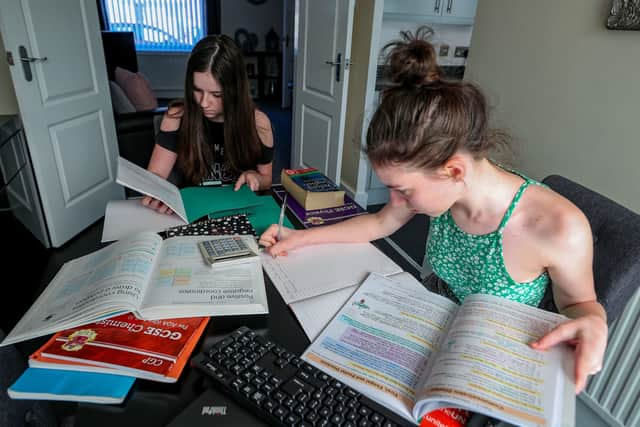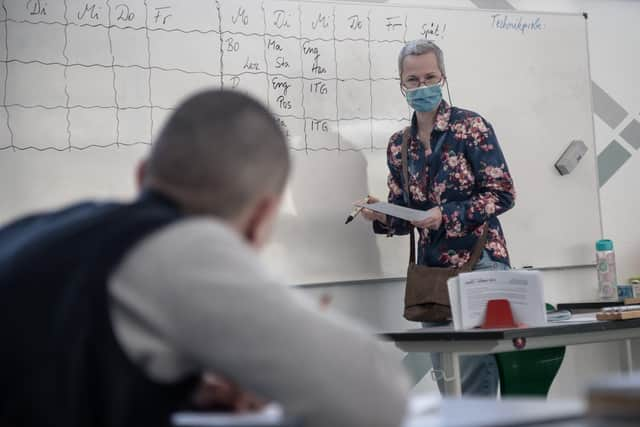Forgotten teenagers will become long-term victims of pandemic: Jayne Dowle
I have every sympathy for parents and teachers struggling to decide the safest options for younger children, in particular Year One and Year Six, the primary cohort Ministers would like to see return to the classroom in June. If I had a five-year-old, I would be as anxious about their unspoken fears as the risk or contracting or spreading coronavirus. I am surprised, given that the Prime Minister is a father, that this aspect has not been addressed in more detail.
Any parent, grandparent or teacher knows that such young children are prey to worries they can’t express. These may manifest themselves in various ways; disruptive behaviour, food refusal, phobias and disturbed sleep. I haven’t heard any Minister – or union representative, for that matter – address this matter of childhood mental health in anywhere near enough detail yet.
Advertisement
Hide AdAdvertisement
Hide AdMy heart goes out to everyone grappling with the dilemma. However, I want to speak up on behalf of secondary school pupils and college students. They are swiftly becoming the forgotten generation. Are Ministers and union leaders assuming that hundreds of thousands of them are all working quietly away at home, partaking religiously in online lessons and submitting work on time?


As a school governor and parent of two teenagers – Lizzie, 14, and Jack, 17 – I’d like to shine a light into the twilight world these youngsters are operating in. We assume, because no one is telling us any different, that they will not be returning to class until September. Jack, studying broadcast journalism at college, has accepted his fate. He’s adapted his end of year project to do telephone interviews, and speaks to his lecturers and classmates online.
However, he’s missing out vital ingredients of media training: lively debate, group decision-making, compromise and context. I fear his bedroom, kitted up with a fancy PC he bought himself from his supermarket job wages, is nothing more than an echo chamber.
Lizzie’s academy school has remained open since lockdown began, with limited attendance by children of key workers and those deemed ‘at risk’ by social services. Technically, Lizzie could return right now, but she’s decided that she is learning more at home. Her teachers, in the main, have been hugely committed to ensuring classes continue uninterrupted online. In school, by necessity, classes are being pulled together and lessons generalised.
Advertisement
Hide AdAdvertisement
Hide AdStaying at home has been no picnic. She has been overwhelmed, at times, to the point of panic. However, since we took action a fortnight ago and instigated the ‘school-day replica model’ – up and at the laptop by 8.30am, break at 11am, lunch at 12.45pm, finish by 3pm – we’ve kind of fallen into a steady routine.


There we sit at the kitchen table, side by side. As a writer, I’m used to working at home, in silence. Lizzie’s constant accompaniment of gentle pop music seems a small price to pay for her mental health.
I was so sad to read about the diligent sixth-form student, Matthew Mackell, who took his own life because he was so worried about doing badly in his A-level exams. This tragedy has brought it home to me; our young people feel so adrift.
Every so often Lizzie starts sobbing and says she doesn’t understand her work. This escalates rapidly into missing her friends and all the extra-curricular activities they enjoyed, such as drama and dance. Lizzie however, is one of the fortunate ones. We have good internet and although Hegarty maths is beyond my limited arithmetic capabilities, I’m not bad at Eng Lit. I’ve also learned things in return; a bit of Spanish conversation and a basic outline of the Battle of the Bulge.
Advertisement
Hide AdAdvertisement
Hide AdWhat though of the young people without access to either technology or a well-meaning parent? What about those whose parents have been obliged to return to work, leaving them home alone for hours on end to organise their own studies (or not)? What will happen in September – if it is September – when all these students finally go back? If the Government thinks organising primary schools is difficult, wait until they’re having to conjure up social distancing rules for 3,000 students and staff in a big inner-city secondary or college. It might be reassuring if we knew they were thinking about measures now, rather than cobbling together a hurried response at the end of August.
I keep telling Lizzie this independent learning will make revising for GCSEs a breeze, but she doesn’t seem convinced. She’s losing touch with what it feels like to be in a classroom, never mind an exam hall. In all ways, this forgotten generation will pay the price for this pandemic.
Editor’s note: first and foremost - and rarely have I written down these words with more sincerity - I hope this finds you well.
Almost certainly you are here because you value the quality and the integrity of the journalism produced by The Yorkshire Post’s journalists - almost all of which live alongside you in Yorkshire, spending the wages they earn with Yorkshire businesses - who last year took this title to the industry watchdog’s Most Trusted Newspaper in Britain accolade.
Advertisement
Hide AdAdvertisement
Hide AdAnd that is why I must make an urgent request of you: as advertising revenue declines, your support becomes evermore crucial to the maintenance of the journalistic standards expected of The Yorkshire Post. If you can, safely, please buy a paper or take up a subscription. We want to continue to make you proud of Yorkshire’s National Newspaper but we are going to need your help.
Postal subscription copies can be ordered by calling 0330 4030066 or by emailing [email protected]. Vouchers, to be exchanged at retail sales outlets - our newsagents need you, too - can be subscribed to by contacting subscriptions on 0330 1235950 or by visiting www.localsubsplus.co.uk where you should select The Yorkshire Post from the list of titles available.
If you want to help right now, download our tablet app from the App / Play Stores. Every contribution you make helps to provide this county with the best regional journalism in the country.
Sincerely. Thank you.
James Mitchinson
Comment Guidelines
National World encourages reader discussion on our stories. User feedback, insights and back-and-forth exchanges add a rich layer of context to reporting. Please review our Community Guidelines before commenting.